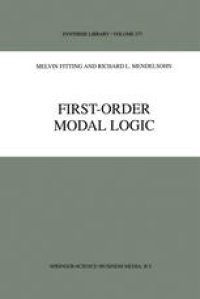
Ebook: First-Order Modal Logic
- Genre: Mathematics // Logic
- Tags: Logic, Mathematical Logic and Foundations, Computational Linguistics
- Series: Synthese Library 277
- Year: 1998
- Publisher: Springer
- Language: English
- pdf
Fitting and Mendelsohn present a thorough treatment of first-order modal logic, together with some propositional background. They adopt throughout a threefold approach. Semantically, they use possible world models; the formal proof machinery is tableaus; and full philosophical discussions are provided of the way that technical developments bear on well-known philosophical problems.
The book covers quantification itself, including the difference between actualist and possibilist quantifiers; equality, leading to a treatment of Frege's morning star/evening star puzzle; the notion of existence and the logical problems surrounding it; non-rigid constants and function symbols; predicate abstraction, which abstracts a predicate from a formula, in effect providing a scoping function for constants and function symbols, leading to a clarification of ambiguous readings at the heart of several philosophical problems; the distinction between nonexistence and nondesignation; and definite descriptions, borrowing from both Fregean and Russellian paradigms.
Fitting and Mendelsohn present a thorough treatment of first-order modal logic, together with some propositional background. They adopt throughout a threefold approach. Semantically, they use possible world models; the formal proof machinery is tableaus; and full philosophical discussions are provided of the way that technical developments bear on well-known philosophical problems.
The book covers quantification itself, including the difference between actualist and possibilist quantifiers; equality, leading to a treatment of Frege's morning star/evening star puzzle; the notion of existence and the logical problems surrounding it; non-rigid constants and function symbols; predicate abstraction, which abstracts a predicate from a formula, in effect providing a scoping function for constants and function symbols, leading to a clarification of ambiguous readings at the heart of several philosophical problems; the distinction between nonexistence and nondesignation; and definite descriptions, borrowing from both Fregean and Russellian paradigms.
Fitting and Mendelsohn present a thorough treatment of first-order modal logic, together with some propositional background. They adopt throughout a threefold approach. Semantically, they use possible world models; the formal proof machinery is tableaus; and full philosophical discussions are provided of the way that technical developments bear on well-known philosophical problems.
The book covers quantification itself, including the difference between actualist and possibilist quantifiers; equality, leading to a treatment of Frege's morning star/evening star puzzle; the notion of existence and the logical problems surrounding it; non-rigid constants and function symbols; predicate abstraction, which abstracts a predicate from a formula, in effect providing a scoping function for constants and function symbols, leading to a clarification of ambiguous readings at the heart of several philosophical problems; the distinction between nonexistence and nondesignation; and definite descriptions, borrowing from both Fregean and Russellian paradigms.
Content:
Front Matter....Pages i-xii
Propositional Modal Logic....Pages 1-45
Tableau Proof Systems....Pages 46-66
Axiom Systems....Pages 67-80
Quantified Modal Logic....Pages 81-115
First-Order Tableaus....Pages 116-131
First-Order Axiom Systems....Pages 132-139
Equality....Pages 140-162
Existence and Actualist Quantification....Pages 163-186
Terms and Predicate Abstraction....Pages 187-203
Abstraction Continued....Pages 204-229
Designation....Pages 230-247
Definite Descriptions....Pages 248-275
Back Matter....Pages 277-292
Fitting and Mendelsohn present a thorough treatment of first-order modal logic, together with some propositional background. They adopt throughout a threefold approach. Semantically, they use possible world models; the formal proof machinery is tableaus; and full philosophical discussions are provided of the way that technical developments bear on well-known philosophical problems.
The book covers quantification itself, including the difference between actualist and possibilist quantifiers; equality, leading to a treatment of Frege's morning star/evening star puzzle; the notion of existence and the logical problems surrounding it; non-rigid constants and function symbols; predicate abstraction, which abstracts a predicate from a formula, in effect providing a scoping function for constants and function symbols, leading to a clarification of ambiguous readings at the heart of several philosophical problems; the distinction between nonexistence and nondesignation; and definite descriptions, borrowing from both Fregean and Russellian paradigms.
Content:
Front Matter....Pages i-xii
Propositional Modal Logic....Pages 1-45
Tableau Proof Systems....Pages 46-66
Axiom Systems....Pages 67-80
Quantified Modal Logic....Pages 81-115
First-Order Tableaus....Pages 116-131
First-Order Axiom Systems....Pages 132-139
Equality....Pages 140-162
Existence and Actualist Quantification....Pages 163-186
Terms and Predicate Abstraction....Pages 187-203
Abstraction Continued....Pages 204-229
Designation....Pages 230-247
Definite Descriptions....Pages 248-275
Back Matter....Pages 277-292
....